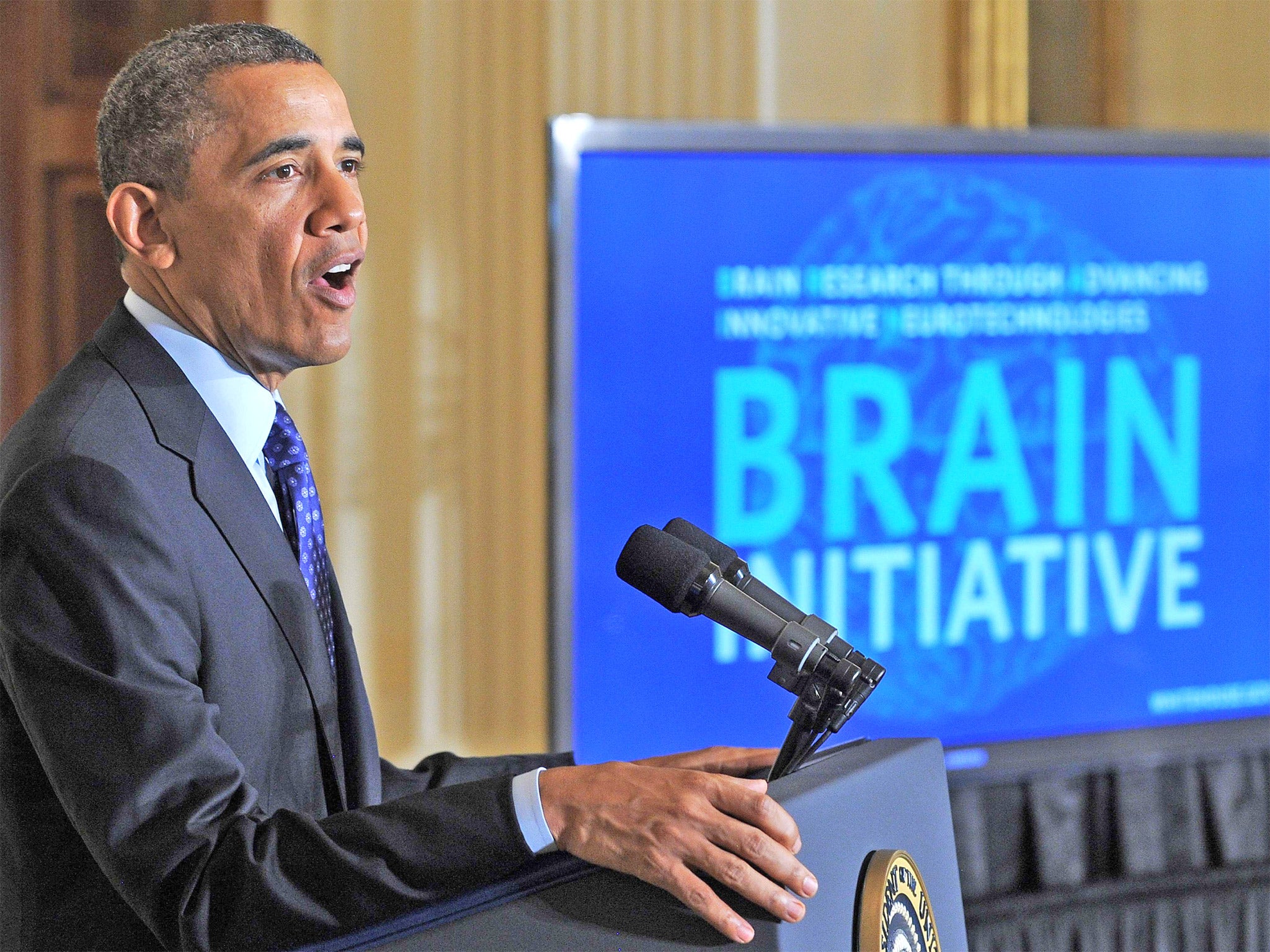President Barack Obama pledges $100m to unlock secrets of the brain

Your support helps us to tell the story
From reproductive rights to climate change to Big Tech, The Independent is on the ground when the story is developing. Whether it's investigating the financials of Elon Musk's pro-Trump PAC or producing our latest documentary, 'The A Word', which shines a light on the American women fighting for reproductive rights, we know how important it is to parse out the facts from the messaging.
At such a critical moment in US history, we need reporters on the ground. Your donation allows us to keep sending journalists to speak to both sides of the story.
The Independent is trusted by Americans across the entire political spectrum. And unlike many other quality news outlets, we choose not to lock Americans out of our reporting and analysis with paywalls. We believe quality journalism should be available to everyone, paid for by those who can afford it.
Your support makes all the difference.A new era in the understanding of the human brain - the most complex structure in the known universe - began today when President Obama announced a $100m (£67m) research initiative to start mapping the complex neural circuitry of the mind.
The aim is to understand what goes wrong in a range of debilitating neurological conditions, from childhood autism to Alzheimer's disease, and provide new treatments and possibly cures for brain disorders that have become the biggest medical burden in the developed world.
Although the initial funding for the Brain Research through Advancing Innovative Neurotechnologies (BRAIN) is relatively small compared to other big research initiatives, President Obama said that it would kick start a field of endeavour that has been likened to the $3.6bn human genome project to map the complete DNA sequence of man.
“As humans we can identify galaxies light-years away, study particles smaller than an atom but we still haven't unlocked the mystery of the three pounds of matter that sits between our ears,” President Obama said at a White House news conference.
In his state of the union address in February, Obama hinted that brain research would be boosted to stimulate the economy as well as providing deeper insights into one of the great mysteries of medical science - understanding how the brain works and why it can go wrong.
“If we want to make the best products, we also have to invest in the best ideas. Every dollar we invested to map the human genome returned $140 to our economy - every dollar. Today, our scientists are mapping the human brain to unlock the answers to Alzheimer's….Now is the time to reach a level of research and development not seen since the height of the space race,” President Obama said.
The BRAIN initiative is directed at mapping the neural circuits of the brain with novel technologies such as tiny nanosensors and wireless fibre-optic tools, in conjunction with more traditional methods such as magnetic resonance imaging - the hospital scanners that have already revolutionised the understanding of some brain function.
“This initiative is a boost for the brain, like the human genome project was for the genes. This is the start of the million-neuron march,” said Terry Sejnowski, an eminent neuroscientist at the Salk Institute in La Jolla, California and expert in computational modelling of the complex interactions between brain cells.
“Many of the most devastating human brain disorders, such as depression and schizophrenia, only seem to emerge when large-scale assemblies of neurons are involved,” Dr Sejnowski said.
“Other terrible conditions such as blindness and paralysis result from disruptions in circuit connections. The more precise our information about specific circuits, the more we will understand what went wrong, where it went wrong and how to target therapies,” he said.
The BRAIN initiative will be orchestrated by America's federal research institutes in cooperation with the private sector. It is intended to grow into what will become the largest collaborative research effort into brain disorders.
It is not the only such initiative, however. Earlier this year, the European Commission announced the Human Brain Project, one of two flagship science programmes involving more than 80 research institutions from across Europe with a combined budget of €1.19bn over 10 years.
Neither is Obama the first US President to take an interest in brain science. In 1990 President George H W Bush announced that the 1990s would be the “decade of the brain” as part of an initiative to focus attention on the neurological sciences.
Join our commenting forum
Join thought-provoking conversations, follow other Independent readers and see their replies
Comments